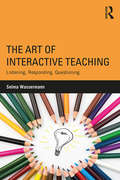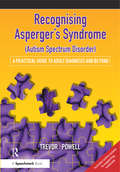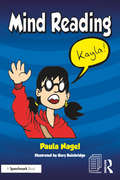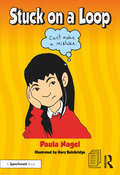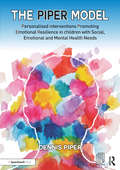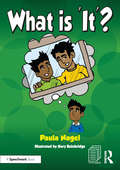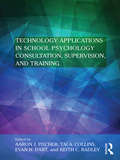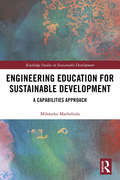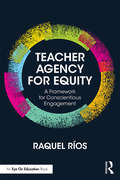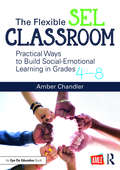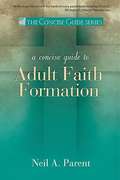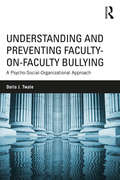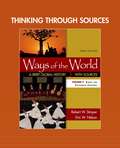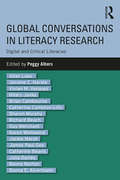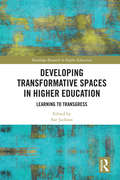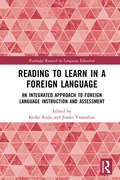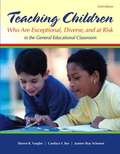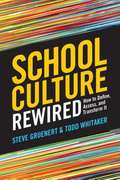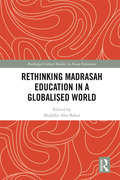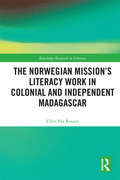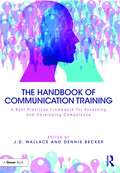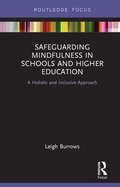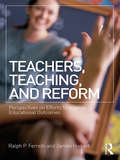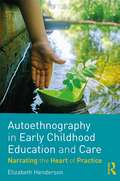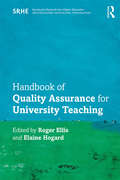- Table View
- List View
The Art of Interactive Teaching: Listening, Responding, Questioning
by Selma WassermannIn this book, Selma Wassermann, international expert on classroom interactions, sets the stage for the relevance of the interactive teaching method, provides data and classroom examples that support its effectiveness at all student learning levels and in different subject areas, and offers detailed and specific help for teachers who are considering embarking on this approach to teaching. Coverage includes "teaching to the big ideas," preparing students, and the basics of developing good listening, responding, and questioning skills in an interactive discussion. A chapter on learning to become reflective practitioners deals with how teachers may become more aware of what they are saying and in better control of framing responses and questions in the art of interactive teaching. The book draws from the author’s long experience and study of interactive teaching using the case method rooted in the Harvard Business School’s approach to large class instruction.
Recognising Asperger's Syndrome (Autism Spectrum Disorder): A Practical Guide to Adult Diagnosis and Beyond
by Trevor PowellWritten by a clinical neuropsychologist, this book is an accessible guide to everything you need to know about Asperger Syndrome, offering information and guidance, self-help and coping strategies and illustrated throughout with over 150 personal quotes, vignettes and anecdotes from clients with AS with whom the author has worked with clinically over the last 10 years. The book is deliberately aimed at a broad audience of people: those who have just received a diagnosis and want to know more, those who are considering seeking a diagnosis, family members, relatives, friends and clinicians including mental health workers, psychologists, support workers and all those who work with people with AS. Trevor Powell is a Consultant Clinical Psychologist who is the Lead for Neuropsychology services for Berkshire Healthcare NHS Trust. He has written a number of books and research articles having worked clinically for over 30 years in the field of adult mental health, brain injury, particularly head injury, and with adults with Asperger's syndrome/Autism.
Mind Reading: But What If...; Mind Reading; Stuck On A Loop; Waht Is It? (Rollercoaster Series)
by Paula NagelThis is a focus on feelings of social isolation and unhelpful thinking habits linked to friendship difficulties. Stacie wonders why her best friend, Kayla, ignores her when she sees her in town at the weekend. All weekend she thinks about the possible reasons, and imagines some of the negative things Kayla might be saying or thinking about her. By Monday morning, she has convinced herself they are true, and that Kayla no longer wants to be her friend. She avoids Kayla at school, which causes further problems. At break time Stacie sees Kayla with another group of girls and imagines they are talking about her. At the end of the day Kayla catches up with Stacie and asks her if she has done something wrong. Stacie says she knows Kayla no longer wants to be her friend because she ignored her in town. Kayla explains she had just been fitted with her new contact lenses and didn't even see her! Stacie is shocked and confesses how she imagined she knew what Kayla was thinking and saying about her. Kayla laughs and they joke about Stacie being a very poor 'mind reader'. Stacie agrees that if she catches herself mind reading again then she will test out her thoughts by talking about them. The accompanying, 'Let's talk about.mind reading,' highlights this common thinking error, and suggests further coping strategies. Paul Nagel has worked as an educational psychologist for 17 years. This has included working as a Lead Professional Educational Psychologist managing a traded service, as well as holding Senior Specialist posts for early years and disability. Over the years Paula has worked in multi agency teams within paediatric services, youth offending teams, Sure Start and an anti bullying service. She is currently Principal Educational Psychologist (North) for the national children's mental health charity, Place2Be. Before qualifying as an Educational Psychologist Paula was a primary school teacher. Gary Bainbridge is an artist, comics creator and secondary school Art, Photography and Media Studies teacher from Durham. He's best known for the North East based kitchen sink superhero comic Sugar Glider and the Newcastle-set crime fiction comic, Nightbus. Gary teaches at an academy in Northumberland.
Stuck on a Loop: But What If...; Mind Reading; Stuck On A Loop; Waht Is It? (Rollercoaster Series)
by Paula NagelThis is a focus on intrusive thoughts and repetitive behaviour, linked to exam anxiety. Everyone knows Gemma always gets thing 'right' and is top of the class. However she feels under pressure to do well in the Year 5 tests and is becoming increasingly worried. She thinks she has to do certain things to continue to do well and get 'top marks', such as avoiding the cracks in the pavement. This habit starts to take over and Gemma wonders why she is doing this. As the story progresses, Gemma is helped to understand how it can be normal for anxiety and stress to affect thoughts. The metaphor of having a bully in her mind, making her do things she doesn't really want to do, is introduced. She decides to stand up to her inner bully before it takes over. The accompanying, 'Let's talk about. when thoughts get stuck,' highlights how stress and pressure can affect us, including some of the 'catastrophising' and 'black and white' thinking errors that can be linked with exam stress and pressure. Paul Nagel has worked as an educational psychologist for 17 years. This has included working as a Lead Professional Educational Psychologist managing a traded service, as well as holding Senior Specialist posts for early years and disability. Over the years Paula has worked in multi agency teams within paediatric services, youth offending teams, Sure Start and an anti bullying service. She is currently Principal Educational Psychologist (North) for the national children's mental health charity, Place2Be. Before qualifying as an Educational Psychologist Paula was a primary school teacher. Gary Bainbridge is an artist, comics creator and secondary school Art, Photography and Media Studies teacher from Durham. He's best known for the North East based kitchen sink superhero comic Sugar Glider and the Newcastle-set crime fiction comic, Nightbus. Gary teaches at an academy in Northumberland.
The Piper Model: Personalised Interventions Promoting Emotional Resilience in children with Social, Emotional and Mental Health Needs
by Dennis PiperThis book is intended to be both a practical evidence-based tool and an awareness-raising resource for teachers, teaching assistants, mentors and all adults who work with children and young people who present as 'extremely challenging' in the school context. In every school there are a small number of pupils, less than five percent, who take up more than fifty percent of the staff's time. This book provides school staff with an approach to personalised interventions that enable those children or young people to build life-long resilience skills.
What is it?: But What If...; Mind Reading; Stuck On A Loop; Waht Is It? (Rollercoaster Series)
by Paula NagelThis is a focus on low mood associated with bereavement. Sam feels low and fed up, but doesn't understand why he feels this way. Everyone else has an opinion on the change in his behaviour. His teacher thinks he is being lazy and can't be bothered to finish his work, his mum thinks he is moody and bad tempered, his friends think he is no fun any more and turning into a bore. Comments like, 'Cheer up it might never happen', ' What has got into you?' and 'Do you want to talk about it?' just upset him even more. He doesn't know what the 'it' is, that is making him feel this way. He didn't even feel this bad when his cousin died a year ago! When he is kept behind in class for not completing his work he tells the teacher how confused and sad he feels. Connections are made between his feelings and the looming anniversary of his cousin's death. Sam is helped to understand that thoughts and feelings associated with bereavement can come and go for a long time, and can cause strong emotions. He is shown how to notice and share his feelings and to think about things he can do when he feels this way. He makes a memory box so he can also remember all the happy things about his cousin. In the 'Let's talk about .sadness and loss,' section, feelings associated with bereavement and helpful coping strategies are shared. Paul Nagel has worked as an educational psychologist for 17 years. This has included working as a Lead Professional Educational Psychologist managing a traded service, as well as holding Senior Specialist posts for early years and disability. Over the years Paula has worked in multi agency teams within paediatric services, youth offending teams, Sure Start and an anti bullying service. She is currently Principal Educational Psychologist (North) for the national children's mental health charity, Place2Be. Before qualifying as an Educational Psychologist Paula was a primary school teacher. Gary Bainbridge is an artist, comics creator and secondary school Art, Photography and Media Studies teacher from Durham. He's best known for the North East based kitchen sink superhero comic Sugar Glider and the Newcastle-set crime fiction comic, Nightbus. Gary teaches at an academy in Northumberland.
Technology Applications in School Psychology Consultation, Supervision, and Training (Consultation, Supervision, and Professional Learning in School Psychology Series)
by Aaron J. Fischer Tai A. Collins Evan H. Dart Keith C. RadleyTechnology Applications in School Psychology Consultation, Supervision, and Training explores the ways in which the field of school psychology is using technological innovations to support and improve graduate student training and supervision, as well as school consultation. Chapters based on current research and written by experts address the integration of telehealth tools and strategies such as telepresence robots, bug-in-the-ear devices, videoconferencing, virtual platforms, and more, including a section dedicated to navigating practical, ethical, and legal concerns. Throughout, the volume engages with relevant considerations relating to data management, professional standards, and regulatory guidelines. This is a comprehensive and up-to-date resource for all those looking to understand the place and potential of established and emerging technologies within school psychology training and practice.
Engineering Education for Sustainable Development: A Capabilities Approach (Routledge Studies in Sustainable Development)
by Mikateko MathebulaThis book demonstrates how the theoretical concepts of the capabilities approach can be applied in the context of engineering education, and how this could be used to add nuance to our understanding of the contribution higher education can make to human flourishing. In demonstrating the usefulness of the capability approach as a lens through which to evaluate the outputs of engineering education, the author also shows how the capability approach can be informed by, and informs, the concept of ‘sustainable development’ and discusses what pedagogical and curricula implications this may have for education for sustainable development (ESD), particularly in engineering. As such, the book builds on the work of scholars of engineering education, and scholars of university education at the nexus of development and sustainability. Engineering employers, educators and students from diverse contexts discuss both the capabilities and functions that are enlarged by engineering education and the impact these can have on pro-poor engineering or public-good professionalism. The book therefore makes an original conceptual and empirical contribution to our thinking about engineering education research. The book provides inspiration for both engineering educators and students to orient their technical knowledge and transferable skills towards the public good. It will also be of great interest to students and researchers interested in education for sustainable development more generally and to engineers who are interested in doing work that is aligned with the goals of social justice. The book will also appeal to scholars of the capability approach within higher education.
Teacher Agency for Equity: A Framework for Conscientious Engagement
by Raquel RíosThis book provides educators with a conceptual framework to explore and develop authenticity and agency for equity. In response to growing cynicism within the field of education, Raquel Ríos argues that in order to become authentic agents of change, teachers must take a stance of mindful inquiry and examine the role of a teacher within the broader socio-political context. By utilizing the six principles of Conscientious Engagement, teachers can expand their awareness of the power of language and thought, the complex nature our professional relationships, and how we channel energy in ways that can impede or strengthen our work for equity. Full of real-world stories and input from practitioners in the field, this book helps teachers of all levels develop the skills and confidence to grapple with tough philosophical and ethical questions related to social justice and equity, such as: What is poverty consciousness and what responsibility do we owe students who come from poorer communities? How does racist ideology impact our thinking and practice in education? How can we tap into an evolutionary consciousness and collective purpose in order to transform how we advocate for equity? How can we expand our professional network for the integration of new ideas? How can teachers really make a difference that matters, a difference that extends beyond the four walls of the classroom?
The Flexible SEL Classroom: Practical Ways to Build Social Emotional Learning in Grades 4–8
by Amber ChandlerHelp middle school students tackle daily challenges both in and out of the classroom. In this new co-publication from Eye On Education and AMLE, author Amber Chandler offers practical strategies for incorporating social emotional learning into your instruction so students can learn to successfully manage their emotions, set goals, build relationships, and make good decisions. Grounded in classroom experience, her advice can be adapted to suit different needs, so you can create a Flexible Classroom and reach all learners. Topics include: Encouraging academic risk-taking without causing stress or fear of failure; Helping students to self-manage through technology and other tools; Teaching self-awareness through solution statements, metacognition, and effective communication; Modeling responsible decision-making and empathy to create a more tolerant classroom environment; Building relationship skills and encouraging students to be Upstanders; and Emboldening students to become more socially aware and cognizant of bias. Bonus: Downloadable versions of some of the handouts in this book are available on the Routledge website at www.routledge.com/9781138302563, so you can print and distribute them for immediate classroom use.
A Concise guide to Adult Faith Formation (The Concise Guide Series)
by Neil A. ParentParent articulates his view that learning about the faith in adulthood is not merely an extension of basic childhood religious education, but is rather a continuous, lifelong process. Drawing from years of experience leading the National Conference for Catechetical Leadership, Parent combines Church teaching and adult learning theory to make this a must-read for pastors, catechists, and students in faith formation ministries.
Understanding and Preventing Faculty-on-Faculty Bullying: A Psycho-Social-Organizational Approach
by Darla J. TwaleUnderstanding and Preventing Faculty-on-Faculty Bullying provides a comprehensive understanding of workplace harassment, aggression, violence, bullying, and incivility in academia. Using a psychological, sociological, and organizational approach, this book explores the issue from the perspective of the individual, the department, and from the higher education organization. Providing research on the effects on victims and collegial culture, this important volume brings together interdisciplinary scholarship to present research-based suggestions for recovering from workplace bullying, recommendations for improving toxic academic environments, and practical advice about policy development to improve academic organizational culture and climate.
Thinking Through Sources For Ways Of The World: A brief Global History
by Robert W. Strayer Eric W NelsonDesigned specifically to be used with all versions of Ways of the World, Third Edition, this document collection complements and extends each chapter of the parent textbook. As the title of the collection suggests, these document projects enable students to "think through sources" and thus begin to understand the craft of historians as well as their conclusions. They explore in greater depth a central theme from each chapter, and they integrate both documentary and visual sources. Each source includes a brief headnote that provides context for the source and several questions to consider, and the chapter ends with a series of probing essay questions appropriate for in-class discussion and writing assignments. In addition to this print volume, we are delighted to offer the Thinking through Sources document projects in LaunchPad, Bedford's learning platform. In LaunchPad, these features are surrounded by a distinctive and sophisticated pedagogy of auto-graded exercises. Featuring immediate substantive feedback for each rejoinder, these exercises help students learn even when they select the wrong answer. These unique exercises guide students in assessing their understanding of the sources, in organizing those sources for use in an essay, and in drawing useful conclusions from them. In this interactive learning environment, students will enhance their ability to build arguments and to practice historical reasoning.
Global Conversations in Literacy Research: Digital and Critical Literacies
by Peggy AlbersIn this volume, renowned literacy and language education scholars who have shaped policy and practice aimed toward social justice and equity address current intellectual and practical issues in the teaching of literacy in classrooms and educational environments across diverse and international settings. Drawn from talks that were presented live and hosted by Global Conversations in Literacy Research (GCLR), an online open-access critical literacy project, this book provides access, in edited written form, to these scholars’ critically and historically situated talks. Bringing together talks on diverse topics—including digital and media literacy, video games, critical literacy, and ESOL—Albers preserves the scholars’ critical discourses to engage readers in the conversation. Offering a broad and expansive understanding of what literacy has to offer for scholars, teachers, and students, this book demonstrates the importance of positioning literacy as a social practice and brings critical literacy to a global audience.
Developing Transformative Spaces in Higher Education: Learning to Transgress (Routledge Research in Higher Education)
by Sue JacksonHigher education has been presented as a solution to a host of local and global problems, despite the fact that learning and assessment can also be used as mechanisms for exclusion and social control. Developing Transformative Spaces in Higher Education: Learning to Transgress demonstrates that even when knowledge may appear to be the solution, it can be partial and disempowering to all but the dominant groups. The book shows the need to contest such knowledge claims and to learn to transgress, rather than to conform. It argues that transformative spaces need to be found and that these should be about the creation of new opportunities, ways of knowing and ways of being. Working in and through spaces of transgression, the contributors to this volume develop frameworks for the possibilities of transformative spaces in learning and teaching in higher education. The book critiques the ways in which Western higher education culture determines the academic agenda in relation to dialogue on social differences, minority groups and hierarchical structures, including issues of representation among different groups in the population. It also explores the personal and political costs of transgression and outlines ways in which transitions can be transformative. The book should be of interest to academics, researchers and postgraduate students engaged in the study of higher education, education studies, teacher training, social justice and transformation. It should also be essential reading for practitioners working in post-compulsory education.
Reading to Learn in a Foreign Language: An Integrated Approach to Foreign Language Instruction and Assessment (Routledge Research in Language Education)
by Keiko Koda Junko YamashitaThis book describes a theory-guided approach to Foreign Language (FL) course development, implementation, instruction and assessment. It documents the development and implementation of a theory-guided approach designed to exploit cross-linguistically sharable competencies as resources for promoting FL learning. The volume delineates the processes of (a) identifying cross-linguistically sharable competencies, (b) exploring ways of exploiting sharable competencies as resources in promoting language skills through their purposeful use for content learning, (c) implementing the instructional approach in multiple EFL classrooms, and (d) evaluating the approach by comparing learning outcomes across classrooms. It presents a solid conceptual framework that integrates theories in multiple research domains, including second language acquisition, knowledge acquisition, and language assessment. It also provides detailed descriptions of framework construction and classroom implementation – the two processes that are integral to course design and development.
Teaching Students Who Are Exceptional, Diverse, And At Risk In The General Education Classroom
by Candace Bos Jeanne Schumm Sharon VaughnIn this widely popular book, pre- and in-service elementary and secondary school teachers get the tools and confidence they need to meet the educational, behavioral, and social needs of every student in today’s diverse classrooms. With its numerous learning activities and sample lessons—plus stories from teachers, students, and parents—it features a strong focus on applying practical, proven strategies for effective teaching and learning. Teaching Students Who Are Exceptional, Diverse, and at Risk in the General Education Classroom is the ideal guide for today’s busy classroom teachers who identify students with special needs as both their greatest challenges and often their greatest rewards.
School Culture Rewired: How to Define, Asses, and Transform It
by Todd Whitaker Steve GruenertYour school is a lot more than a center of student learning--it also represents a self-contained culture, with traditions and expectations that reflect its unique mission and demographics. In this groundbreaking book, education experts Steve Gruenert and Todd Whitaker offer tools, strategies, and advice for defining, assessing, and ultimately transforming your school's culture into one that is positive, forward-looking, and actively working to enrich students lives. Drawing from decades of research on organizational cultures and school leadership, the authors provide everything you need to optimize both the culture and climate of your school, including: <p><p> - "Culture-busting" strategies to help teachers adopt positive attitudes, outlooks, and behaviors; <p> - A framework for pinpointing the type of culture you have, the type that you want, and the actions you need to take to bridge the two; <p> - Tips for hiring, training, and retaining teachers who will actively work to improve your school's culture; and <p> - Instructions on how to create and implement a successful School Culture Rewiring Team. <p> Though often invisible to the naked eye, a school's culture influences everything that takes place under its roof. Whether your school is urban or rural, prosperous or struggling, School Culture Rewired is the ultimate guide to making sure that the culture in your school is guided first and foremost by what's best for your students.
Rethinking Madrasah Education in a Globalised World (Routledge Critical Studies in Asian Education)
by Mukhlis Abu BakarWhy is there a need to rethink madrasah education? What is the positioning of Muslims in contemporary society, and how are they prepared? What is the role of the ulama in the reform process? This book explores these questions from the perspective of madrasah education and analyses curricular and pedagogic innovations in Islamic faith-based education in response to the changing place of Islam in a globalised world. It argues for the need for madrasahs to reconceptualise education for Muslim children. Specifically, it explores the problems and challenges that come with new knowledge, biotechnological advancement and societal transformation facing Muslims, and to identify the processes towards reformation that impinge on the philosophies (both Western and Islamic), religious traditions and spirituality, learning principles, curriculum, and pedagogy. This book offers glimpses into the reform process at work through contemporary examples in selected countries.
The Norwegian Mission’s Literacy Work in Colonial and Independent Madagascar (Routledge Research in Literacy #11)
by Ellen Vea RosnesOffering an original historical perspective on literacy work in Africa, this book examines the role of the Norwegian Lutheran mission in Madagascar and sheds light on the motivations that drove colonizing powers’ literacy work. Focusing on both colonial and independent Madagascar, Rosnes examines how literacy practices were facilitated through mission schools and the impact on the reading and writing skills to Malagasy children and youth. Analysing how literacy work influenced identity formation and power relations in the Malagasy society, the author offers new insights into the field of language and education in Africa.
The Handbook of Communication Training: A Best Practices Framework for Assessing and Developing Competence
by J D Wallace Dennis BeckerCommunication remains a significant topic for job acquisition, development, and advancement. As such, there are no shortage of classes, seminars and books written on the subject. However, there are few designed for the corporate consultant that are not aligned with some proprietary system, traditional academic classrooms, or author’s speculation. These tend to be either inaccessible, questionable in their content, or specifically aligned with the producers’ interests. So where can the Communication trainers and consultants go to focus on fundamental touchstone research and practices? The Handbook of Communication Training is a powerful template, and first of its kind, for communication practitioners and academicians who wish to strengthen their professional capabilities. It also acts as a guide and standard for consumers and clients of these services. The chapters within are an outgrowth of the National Communication Association’s Training & Development Division’s desire to provide guidance, structure, and support for members and non-members alike. It is specifically targeted at those pursuing best practices regarding communication consulting, coaching, teaching and training. The 7 Best Practices presented in this book represent capabilities that are foundational to the effective transfer of communication promotion and skill enhancement. As such, these practices, and supporting chapters, should appeal to novice and experts alike.
Safeguarding Mindfulness in Schools and Higher Education: A Holistic and Inclusive Approach
by Leigh BurrowsAlthough mindfulness can be located in a number of different traditions and disciplines, it was originally an esoteric and powerful practice based on developing a capacity attainable only by certain people. After previously publishing on the positive outcomes, in this book the author identifies a range of adverse effects of mindfulness meditation for some individuals that, from the point of view of mindfulness in schools and higher education, represents uncharted territory. The author demonstrates through research, personal experience and case studies how mindfulness activities can be safe for all students in education settings including the most vulnerable. This book assists teachers in school and higher education settings to make informed decisions about whether to include mindfulness in their teaching, depending on their own capacity, student cohorts and activities to make sure it is safe for more vulnerable students. This guidance is based on a combination of existing pedagogical and clinical knowledge about meeting the needs of vulnerable students, clients and patients and the specialized expertise of trained mindfulness clinicians and teachers. This book puts school and university teachers in the driver’s seat as regards mindfulness teaching in education settings. It argues that the only way forward for mindfulness in education is to adopt an individualized approach which builds on what effective teachers already do in their work with vulnerable students through extending their knowledge about mindfulness and its possible effects. In this way teachers’ existing skills are celebrated and extended, and mindfulness pedagogy develops organically with teachers, becoming a genuine and felt experience both for themselves and their students rather than an ‘add-on’ intervention.
Teachers, Teaching, and Reform: Perspectives on Efforts to Improve Educational Outcomes
by Ralph P. Ferretti James HiebertComprised of contributions from distinguished education scholars, Teachers, Teaching, and Reform takes a critical look at evidence about systemic efforts to identify excellent teachers and promote excellent teaching practices. Organized to include diverse and often contrasting perspectives on the topic, this book provides insight into some of the most vexing historical issues affecting the policies that shape current reform initiatives focused on teachers, teaching, and educational outcomes. Educational scholars, policy makers, instructors, and graduate students will come away with a keen understanding of different perspectives about the assessment of teachers, teaching, and teacher education programs, as well as strategies for improving educational outcomes for students.
Autoethnography in Early Childhood Education and Care: Narrating the Heart of Practice
by Elizabeth HendersonAutoethnography in Early Childhood Education and Care both embraces and explores autoethnography as a methodology in early childhood settings, subsequently broadening discourses within education research through a series of troubling narratives. It breaks new ground for researchers seeking to use non-conventional practices in early years research. Drawing together research and literature from several disciplines, this unique book challenges the perception of what it means to be an early years practitioner: powerful and compelling narratives, from the author’s first-hand experiences, offer both a creative and scholarly insight into the issues faced by those working in early childhood settings. This text: offers insight into working with autoethnography; its purpose and methodological tensions; provides professionals engaged in caring relational approaches with a series of vignettes for training and further reflection; encourages a wider debate and discussion of core values at a critical time in early years practice and other caring professions skilfully and sensitively illustrates how to adopt a creative research imagination. This book is a valuable read for researchers, postgraduate students and other professionals working in early childhood education and care seeking to give expression to their voices through creative methodologies such as autoethnography in qualitative research.
Handbook of Quality Assurance for University Teaching
by Roger Ellis Elaine HogardThis practical and authoritative handbook provides a comprehensive overview of the issues and approaches to assuring quality in university teaching. Including contributions from major international figures, the book contains a wealth of ideas and practical advice to help universities commit to quality in teaching and offers insights into how the topics raised can be directly applied. The book initially identifies some of the key issues surrounding the topic, such as the evidence-based identification of teaching quality; the training of university lecturers and faculty; external and internal quality assurance; the tension between professional autonomy and governmental regulation; and the involvement of students in developing quality. It then moves on to present ideas and initiatives to address these problems, tackling the subject through four sections: Assuring Quality – questioning what quality assurance means and how it might be practised; Identifying Quality – examining what knowledge exists at present and how it might be further researched; Developing Quality – investigating the development of staff through teacher training and appraisal; Case Studies of Quality Assurance – reviewing six case studies of quality assurance in a range of contrasting subjects including the professional subjects of Medicine, Nursing and Teacher Training which are also addressed systemically in the first section. Full of practical advice, Handbook of Quality Assurance for University Teaching is an invaluable and unique resource for Faculty, Subject Leaders, University Administrators and Quality Assessors.
